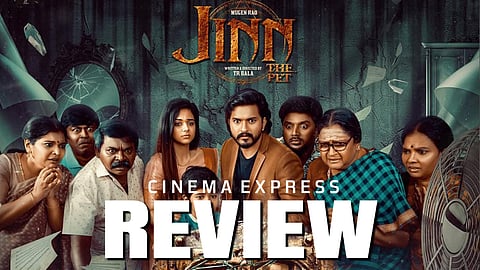Jinn—The Pet Movie Review: This tale about a jinn makes us wish for better writing
Jinn—The Pet(1.5 / 5)
The risk in saving the best for last is that the supposed 'best' might not necessarily be so. Jinn—The Pet struggles with a similar issue, which saves a relatively better portion for the final act. TR Bala's Jinn—The Pet begins with Sakthi (Mugen Rao), who is always on the other side of luck, buying a tamed jinn confined to a box. He leaves Malaysia for India with this box after working in a music band for five years. His objective in Chennai is to form a music band and continue his gig work in festivals and restobars. He thinks he can flip his luck with the help of the jinn, but things go haywire. What the jinn is up to and whether Sakthi gets what he wants becomes the core of the film.
Jinn—The Pet suffers from an identity crisis right from the beginning as to whether it is a fantasy, horror or drama, as the Kanchana and Conjuring references kept coming. The initial minutes of the film proceed like any other Tamil film that has the hero falling for a girl at first sight. A love song encapsulates their encounters that ultimately lead to their wedding. In between all of this, we get occasional close-up shots of the jinn box with intense music, to periodically remind us of its existence, so that we don't forget it as the writer did. After some flat jokes involving either Sakthi's 'Uyir nanban' Paranjothi (Bala Saravanan) or his father (Imaan Annachi), the film finally decides to explore the jinn. When it does, it leaves gaping holes in the narration and fails to adhere to the logic it establishes.
Director: TR Bala
Cast: Mugen Rao, Bhavya Trikha, Radha Ravi, Vinothini, Bala Saravanan
Red herrings should present equally plausible outcomes to build intrigue and shouldn't be self-contradictory. The film shockingly gives us no reason as to why the jinn was seen getting involved in acts construed as evil when it later on turns out to be the guardian of the family in question. There is no explanation whatsoever on why it does seemingly evil things when it was safeguarding the family all along. The Jinn's character is mired in convenient writing. We get in-depth details of what the jinn consumes, when it consumes, and what not to do with the box it is in, expecting a solid pay-off, but to no avail. In an instance where Sakthi's family is in danger, the jinn acts as a silent spectator, saying it could do nothing as it didn't get anything to eat, only to bash up the bad guys at the hospital moments later. Such writing choices seem to have been employed to make the fights look believable but look shoddy with poor setups. The only positive aspect of the jinn is its VFX design. The rest of the characters, too, are basic and stay on the peripheries. Sakthi is said to be financially struggling but it isn't communicated to us effectively. He is not doing well in life, yet his actions aren't making a case for it. Likewise, Vinothini plays Geetha, Sakthi's sister, who seems to be pregnant for a really long time. There are no indicators effectively registering the passage of time. The film is full of such shoddy writing. The antagonist role is the weakest. A typical 'corporate villain' score is played in the background; he vanishes for a good one hour or so only to resurface during the last 30 minutes.
Jinn—The Pet somewhat finds its feet and becomes coherent in the last act. But it beats around the bush for a dizzyingly long time that it becomes tough to care about the film by then. Though slightly better than the previous portions, this one too is undone by convenient writing. Bhavya Trikha's Priya is in danger due to her identity but she is nabbed only towards the end despite remaining present in that precarious place throughout the runtime. The film, in a nutshell, is in constant tonal confusion and settles for something predictable towards the end with convenient writing doing a disservice to even the relatively better parts.

